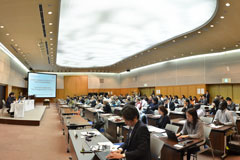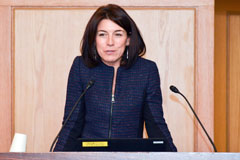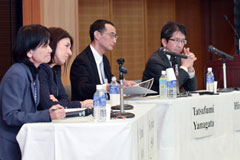What Is Needed to Respond to 'the Changing Nature of Work?' World Development Report 2019 Seminar Held
2019.04.08
The seminar "World Development Report (WDR) 2019: The Changing Nature of Work" was held on Feb. 26, 2019, at the JICA Ichigaya Building in Tokyo jointly by the JICA Research Institute (JICA-RI) and the World Bank Group (WBG).
The WBG has published the World Development Report (WDR) annually since 1978. The WDR is a compilation of analyses of issues and policy recommendations on a timely theme.
The theme of the 2019 report is "The Changing Nature of Work." Coming after the 2018 theme of "Learning to Realize Education's Promise," it compiles research results that emphasize human capital. In addition, the report introduces the Human Capital Index (HCI) that the WBG launched in October 2018.

The seminar "World Development Report (WDR) 2019: The Changing Nature of Work" was held at the JICA Ichigaya Building in Tokyo
At the start of the event, JICA-RI Director Izumi Ohno gave opening remarks. She said both JICA and the WBG are aiming for quality growth and development and giving top priority to human development and human capital from the perspective of achieving human security.
Based on her expertise in Ethiopian industrial policy, regarding trends in the new era of changing work, she said it is important to change mindsets by introducing such soft skills as teamwork and punctuality. The themes discussed in this seminar could contribute to development in developing countries, she added.
Next, Federica Saliola, co-director, World Development Report 2019, WBG, spoke. The report points out that as technology rapidly changes the labor market, expanding investment in the health and education of people is an urgent task. On that point, Saliola said indeed automation tends to rob people of their jobs, while innovation creates new jobs. However, whether people get enough jobs in the automation era depends on whether innovation can outpace automation. She mentioned that changes are occurring both in the ways companies do business and their investments, on the one hand, and in the ways individuals work, on the other.

Federica Saliola, co-director, World Development Report 2019, World Bank Group, gave her keynote speech
Compared with conventional businesses that require enormous capital investments in facilities and that have to be located in a certain physical location, she said, recent IT businesses require no investments other than in technology, and can create employment anywhere and experience accelerated growth. On the other hand, she added, the true state of those businesses is hard to grasp, and they give rise to the problem of legal tax avoidance.
Also, with regard to the working styles of individuals, short-term employment and freelance work of the kind seen in the gig economy are growing rapidly. While skills robots lack such as social skills, the ability to work in teams and the ability to think critically continue to grow in importance, we have to become workers who can adapt to such changes, she said.
Next, Saliola talked about what governments can do in response to such changes. She suggested that policy actions are required in the three areas mentioned in the report: human capital and lifelong learning, social protection and labor policies, and revenue mobilization.
First, with regard to education, she said early childhood education is important as the foundation for learning, but tertiary education is growing in importance because it cultivates skills needed for working, teamwork and cognitive capacity.
Next, talking about social protection and labor policies, she said that because social protection currently reaches neither temporary and short-term workers nor the informal sector workers who make up 65 percent of workers in emerging countries, there should be a minimal level of social assistance. She explained that universal basic income is being debated in many countries. There is a need to improve revenue mobilization to maintain the two pillars of education and social protection and labor policies, she said. And she revealed that the report comes up with some ideas including taxation, energy subsidies and the like to suggest how to pay for the additional investment.
For the panel discussion that followed, Tatsufumi Yamagata, a professor at Ritsumeikan Asia Pacific University and president of Japan Society for International Development, took the stage, along with JICA Senior Advisor Hirotsugu Aiga.
Commenting on Saliola’s talk, Yamagata said that as someone who has researched the textile industry in developing countries, and particularly the substitutability of machines and workers, he agrees with the idea that the advance of technology doesn’t necessarily reduce employment in developing countries.

Members of the panel responded to questions from the audience
In addition, while introducing actual cases from his own research, he expressed his view that it is a matter of the relative costs of adopting machinery and of labor. Low-skill workers will not necessarily be chased away.
When the 2019 report was released, Aiga said, he recalled the 1993 WDR, which was themed “Investing in Health.” He always wanted an indicator like the HCI that converts human capital into a fixed quantity from the point of view of economic productivity, he said.
There are three components to the HCI: “Survival: Will children born today survive to school age?” “School: How much schooling will they complete and how much will they learn?” and “Health: Will they leave school in good health, ready for further learning and/or work as adults?” To motivate policy-makers to invest in human capital, he suggested, a time-related element could be embedded into the HCI to show how quickly a return can be expected.
Because the theme "The Changing Nature of Work" is getting attention today, there were many questions from the audience, including about 1. balancing investments between early childhood and elementary education on the one hand, and higher education on the other, 2. the process of learning non-cognitive skills, and 3. the fields in which educational reform is needed in Africa, and a lively discussion took place.
Ohno wrapped up the seminar by saying, with regard to nurturing non-cognitive skills, she thinks it is an area where Japan's long years of experience could be put to good use, and expressed her hope that JICA-RI will continue to be engaged in a debate on that topic.

事業事前評価表(地球規模課題対応国際科学技術協力(SATREPS)).国際協力機構 地球環境部 . 防災第一チーム. 1.案件名.国 名: フィリピン共和国.

事業事前評価表(地球規模課題対応国際科学技術協力(SATREPS)).国際協力機構 地球環境部 . 防災第一チーム. 1.案件名.国 名: フィリピン共和国.

事業事前評価表(地球規模課題対応国際科学技術協力(SATREPS)).国際協力機構 地球環境部 . 防災第一チーム. 1.案件名.国 名: フィリピン共和国.

事業事前評価表(地球規模課題対応国際科学技術協力(SATREPS)).国際協力機構 地球環境部 . 防災第一チーム. 1.案件名.国 名: フィリピン共和国.

事業事前評価表(地球規模課題対応国際科学技術協力(SATREPS)).国際協力機構 地球環境部 . 防災第一チーム. 1.案件名.国 名: フィリピン共和国.
scroll